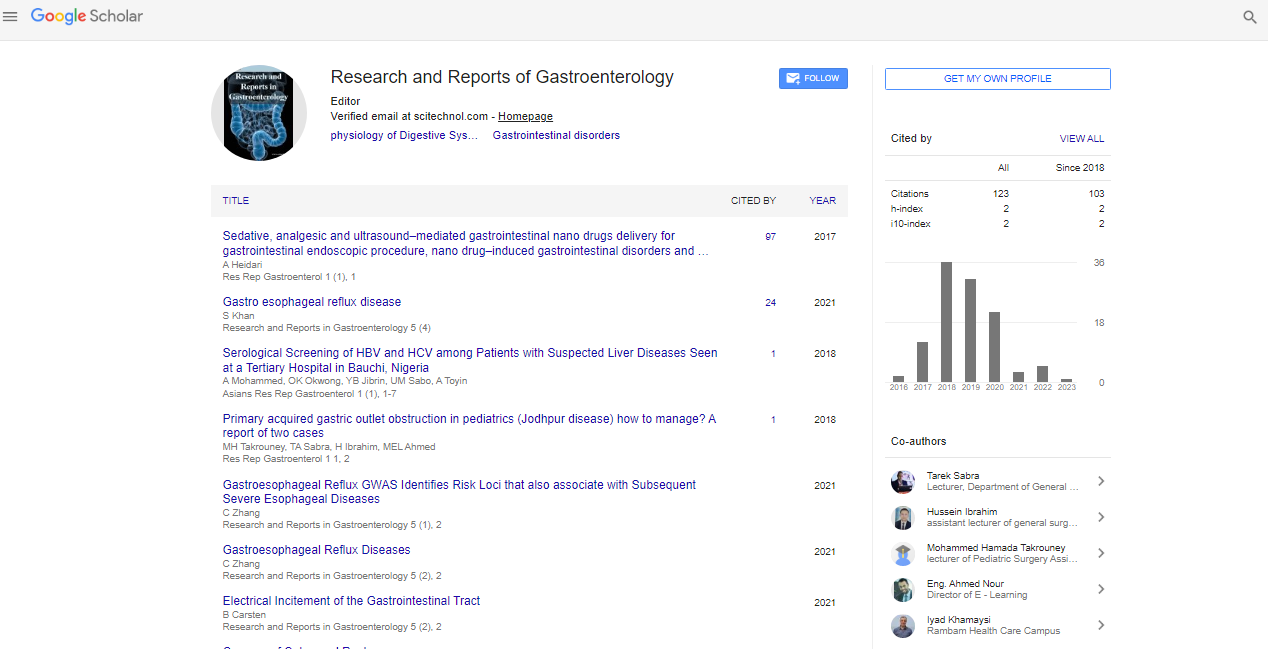Perspective, Res Rep Gastroenterol Vol: 7 Issue: 2
Involvement of Immunotherapy in the Treatment of Advanced Gastrointestinal Cancers
Sandra Welph*
1Division of Gastroenterology, Tufts Medical Center, Boston, USA
*Corresponding Author: Sandra Welph,
Division of Gastroenterology, Tufts
Medical Center, Boston, USA
E-mail: welphsandra@gmail.com
Received date: 15 May, 2023, Manuscript No RRG-23-106620;
Editor assigned date: 17 May, 2023, PreQC No RRG-23-106620(PQ);
Reviewed date: 01 June, 2023, QC No RRG-23-106620;
Revised date: 08 June, 2023, Manuscript No RRG-23-106620 (R);
Published date: 16 June, 2023, DOI: 10.4172/Rrg.1000144
Citation: Welph S (2023) Involvement of Immunotherapy in the Treatment of Advanced Gastrointestinal Cancers. Res Rep Gastroenterol 2023, 7:2.
Abstract
Description
Advanced Gastrointestinal (GI) cancers, including colorectal, gastric ulcers, pa ncreatic infections and liver cancers pose significant challenges due to limited treatment options and poor prognosis. In recent years, immunotherapy has emerged as a promising therapeutic approach for various malignancies, revolutionizing the field of oncology.
Immune checkpoint inhibitors
One of the most significant breakthroughs in cancer immunotherapy has been the development of Immune Checkpoint Inhibitors (ICIs). These drugs target key immune checkpoints, such as programmed cell Death Protein 1 (PD-1) and Cytotoxic T-Lymphocyte-Associated protein 4 (CTLA-4), which regulate immune responses and prevent excessive immune activation. By blocking these checkpoints, ICIs enhance the immune system's ability to recognize and attack cancer cells.
Colorectal cancer
In colorectal cancer, immune checkpoint inhibitors have shown promising results, particularly in patients with Microsatellite Instability-High (MSI-H) or Mismatch Repair-deficient tumors. Pembrolizumab and nivolumab inhibitors have been approved for the treatment of MSI-H colorectal cancer that has progressed after conventional therapies. These agents have demonstrated durable responses and improved overall survival rates in this patient population.
Gastric and esophageal cancers
In gastric and esophageal cancers, immune checkpoint inhibitors have shown efficacy in subsets of patients. Pembrolizumab, as a monotherapy or in combination with chemotherapy, has demonstrated improved overall survival in patients with advanced or metastatic gastric or gastroesophageal junction adenocarcinoma expressing PD. Nivolumab, in combination with chemotherapy, has also shown significant survival benefits in advanced gastric or gastroesophageal junction cancer.
Pancreatic cancer
Pancreatic cancer has traditionally been challenging to treat with immunotherapy due to its immunologically "cold" microenvironment. However, ongoing research is exploring combination therapies with ICIs and other modalities, such as chemotherapy and targeted agents, to enhance immunogenicity and response rates. Preliminary results from clinical trials suggest potential benefits of immunotherapy in select subsets of pancreatic cancer patients, especially those with high tumor mutational burden or specific molecular characteristics.
Hepatocellular carcinoma
Advanced hepatocellular carcinoma represents a major global health burden. Immune checkpoint inhibitors, such as nivolumab and pembrolizumab, have been approved for the treatment that has progressed after sorafenib. These agents have demonstrated improved overall survival and durable responses in a subset of patients, particularly those with high levels of PD-L1 expression.
Combination therapies and biomarkers
Combination therapies incorporating immunotherapy, chemotherapy, targeted agents, and other treatment modalities are being explored to enhance treatment responses in advanced GI cancers. Biomarkers, including PD-L1 expression, tumor mutational burden, and immune-related gene signatures, are being studied to identify patients who are most likely to benefit from immunotherapy. These biomarkers can aid in patient selection and guide personalized treatment strategies.
Challenges and future directions
Despite the promising results of immunotherapy in advanced GI cancers, challenges remain. Not all patients respond to immunotherapy, and resistance mechanisms can develop. Understanding these mechanisms and identifying predictive biomarkers are important for optimizing treatment outcomes. Additionally, managing immune-related adverse events and determining optimal sequencing and combination strategies are areas of ongoing research.
Conclusion
Immunotherapy has transformed the treatment landscape for advanced GI cancers, offering new hope for patients with limited therapeutic options. Immune checkpoint inhibitors have demonstrated clinical efficacy in subsets of patients with colorectal, gastric, esophageal, pancreatic, and hepatocellular cancers. Ongoing research is focused on identifying predictive biomarkers, optimizing combination therapies, and overcoming resistance mechanisms. Immunotherapy holds great promise as a valuable treatment modality and continues to advance the field of oncology, providing opportunities for improved patient outcomes and the potential for long-term disease control in advanced GI cancers.
 Spanish
Spanish  Chinese
Chinese  Russian
Russian  German
German  French
French  Japanese
Japanese  Portuguese
Portuguese  Hindi
Hindi 